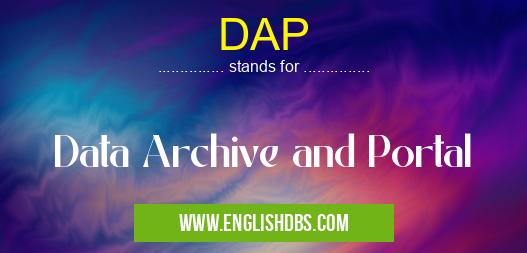What does DAP mean in UNCLASSIFIED
DAP stands for Data Archive and Portal, a comprehensive digital repository and online platform that enables researchers, scholars, and other interested parties to discover, access, and utilize valuable research data. DAPs are designed to ensure the preservation, dissemination, and effective utilization of research data for the advancement of knowledge and societal benefits.

DAP meaning in Unclassified in Miscellaneous
DAP mostly used in an acronym Unclassified in Category Miscellaneous that means Data Archive and Portal
Shorthand: DAP,
Full Form: Data Archive and Portal
For more information of "Data Archive and Portal", see the section below.
Purpose of DAPs
DAPs play a crucial role in promoting research transparency, collaboration, and reproducibility by:
- Preserving and curating research data from a variety of sources and disciplines.
- Providing standardized metadata and documentation to facilitate data discovery and understanding.
- Granting controlled access to authorized users, ensuring data security and privacy.
- Facilitating data analysis and visualization tools to enhance research outcomes.
Key Features of DAPs
- Data Storage and Management: DAPs provide secure and reliable storage for large and complex research datasets, enabling researchers to efficiently manage, organize, and share their data.
- Metadata and Standardization: DAPs implement standardized metadata schemas to describe datasets, making them easily discoverable and interpretable by users.
- Data Access and Sharing: DAPs offer controlled access to data through user-friendly interfaces, allowing researchers to explore, download, and collaborate on the data.
- Data Curation and Preservation: DAPs ensure the long-term preservation of research data by curating it according to best practices and providing ongoing data management support.
- Data Analysis and Visualization: DAPs often integrate data analysis and visualization tools that enable users to explore and analyze the data within the platform, fostering data-driven insights.
Essential Questions and Answers on Data Archive and Portal in "MISCELLANEOUS»UNFILED"
What is DAP (Data Archive and Portal)?
DAP is a comprehensive platform that provides secure storage, access, and management of research data. It enables researchers to deposit, discover, and reuse data, facilitating collaboration and advancing scientific discovery.
Who can use DAP?
DAP is open to researchers, educators, students, and the general public. Researchers can archive their data, while others can search for and access data for non-commercial purposes.
What types of data can be stored in DAP?
DAP supports a wide variety of data formats, including tabular data, images, audio, video, and geospatial data. It also provides specialized support for data types commonly used in specific research disciplines.
How do I deposit data in DAP?
To deposit data, you need to create an account and follow the data submission guidelines. DAP provides tools and support to help you prepare and format your data for archiving.
How can I search for data in DAP?
DAP features a user-friendly search interface that allows you to explore data collections based on keywords, metadata, and other criteria. You can also browse data by discipline or institution.
Can I access data in DAP for commercial purposes?
Data deposited in DAP is generally available for non-commercial use under the terms of a Creative Commons license. For commercial use, you may need to contact the data depositor directly to negotiate appropriate permissions.
How secure is DAP?
DAP employs robust security measures to protect data from unauthorized access, modification, or loss. It adheres to industry best practices and undergoes regular security audits to ensure the confidentiality and integrity of data.
Final Words: DAPs are essential infrastructure for the advancement of research and scholarly communication. By providing a centralized and accessible platform for research data, DAPs empower researchers to conduct more robust and reproducible studies, promote knowledge sharing, and accelerate innovation. As the volume and complexity of research data continue to grow, DAPs will play an increasingly vital role in ensuring the effective management, preservation, and utilization of this valuable resource.
DAP also stands for: |
|
| All stands for DAP |
